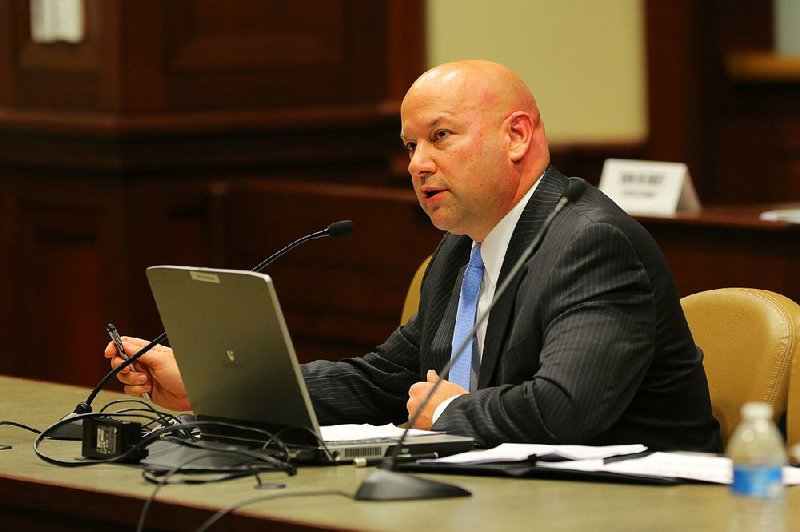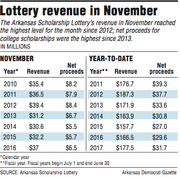Fueled by revenue increases from both scratch-off and draw games, the Arkansas Scholarship Lottery's take in November rose by $4.8 million over the same month a year ago to $37 million.
The lottery's net proceeds, the amount that goes to college scholarships, also increased last month, by about $800,000 over the same period a year ago, to $6.5 million.
"The increase in sales, specifically for Powerball and Natural State Jackpot, helped to increase the amount we were able to raise for proceeds in November," said lottery Director Bishop Woosley.
The lottery's November revenue was the largest for the month since 2012, and the net proceeds were the largest for the month since 2013. In September and October, the lottery reported revenue and net proceeds that trailed those from the same months a year ago.
During the first five months of fiscal 2017, the lottery's revenue and net proceeds both exceeded the figures for the same period in fiscal 2016, the lottery said in its monthly report to Gov. Asa Hutchinson and the Legislative Council Lottery Oversight Subcommittee. Fiscal 2017 started July 1.
The lottery helped provide Arkansas Academic Challenge Scholarships to nearly 35,000 students in the previous fiscal year, and the projection is for nearly 33,000 this year. The lottery started selling tickets on Sept. 28, 2009.
The Legislature has cut the size of future scholarships three times, partly because net proceeds lagged initial projections. But revenue and net proceeds rebounded in fiscal 2016, which ended June 30. State lawmakers have said they want to make sure the rebound is sustainable before increasing scholarship amounts.
[EMAIL UPDATES: Sign up for free breaking news alerts + daily emails of the day's top headlines]
Scratch-off ticket revenue increased from $26.9 million in November 2015 to $29.7 million last month, and draw-game revenue increased from $5.2 million to $7.3 million in November, the lottery reported. The lottery's draw games include Mega Millions, Powerball, the Natural State Jackpot, Cash 3 and Cash 4. The lottery's revenue also includes lottery retailer fees.
Woosley said scratch-off revenue in November increased over the same month last year on the basis of "a strong November launch bolstered by our $5 and $10 tickets.
"Additionally, due to the Thanksgiving holiday, we launched our December tickets in late November, which gave us an extra bump for instant tickets sales for the month. The instant launch was supported by a gifting campaign, which encourages lottery players to give tickets as gifts," he said in written statement. Scratch-off tickets also are referred to as instant tickets.
"Finally, we now have the most retailers we've ever had -- 1,926 -- which also adds to the month's total," Woosley said. At the end of November 2015, the lottery reported 1,903 lottery retailers selling tickets.
Woosley said draw-game revenue increased in November over a year ago because "we had a large Powerball jackpot which eclipsed $400 million in November," and the Natural State Jackpot game had a high jackpot for most of the month.
During the first five months of fiscal 2017, the lottery's revenue totaled $177.5 million -- up from $166.5 million in the same period in fiscal 2016. In the same period, net proceeds totaled $31.7 million -- an increase from the $29.6 million in the same period in fiscal 2016.
The lottery also reported $563,542 in unclaimed prizes in October, boosting the balance of that reserve fund to $4.12 million as of Nov. 30. Under state law, the balance of that fund at the end of the fiscal year, minus $1 million, will be transferred to scholarships.
Woosley, who has been the lottery's director since February 2012, said, "We are currently above budget for proceeds almost $3.2 million for the year."
For fiscal 2017, Woosley is projecting revenue at $463.4 million and net proceeds at $80.9 million.
Fiscal 2016's total revenue was $456.3 million, an increase of $47.1 million over the previous fiscal year. Net proceeds increased by $12.7 million to $85.3 million over what was raised in fiscal 2015. January saw a record Powerball jackpot.
The lottery has a contract with Camelot Global Services, which has offices in London and Philadelphia, for a business plan.
Under the contract, Camelot will receive base compensation and expense reimbursements up to $750,000 a year but also will be eligible for incentive compensation of at least 12.5 percent of the lottery's adjusted operating income above $72.28 million in a fiscal year. The contract also calls for Camelot to help the lottery negotiate contracts with vendors; the savings would be used to help pay for Camelot's services.
The five-year business plan calls for the agency to set up about 600 more terminals, hire five more employees and increase its marketing budget.
Camelot's self-described ambitious business plan projects lottery revenue at $463 million in fiscal 2017, about the same as Woosley projects. It forecasts net proceeds for college scholarships at $81 million in fiscal 2017.
Harold Criswell, senior associate director for the state Department of Higher Education, said Monday that 34,641 students received Arkansas Challenge Scholarships totaling $96.4 million in fiscal 2016.
The department is projecting 32,736 students will receive scholarships totaling $86.3 million in the current fiscal year, he said.
The department had projected handing out fewer scholarships this fiscal year, after the Legislature in 2015 changed the criteria for the scholarship and reduced first-year scholarship sizes.
The number of recent high school graduates awarded the Arkansas Academic Challenge Scholarship for this fiscal year dropped by 1,559 from the previous fiscal year to 11,606, records show. And the number of applications by those traditional students dropped by 3,275 to 16,567, according to the records.
Traditional college students are those who enter college after graduating from high school. Nontraditional students are the rest of college students -- for example, those who delay entering college -- and their numbers are up.
Act 1105 of 2015 requires high school graduates, starting with the Class of 2016, to have ACT scores of at least 19 or the equivalent on comparable college entrance exams to be eligible for the scholarships.
High school graduates previously were required to have completed the Smart Core Curriculum and achieved either a high school grade-point average of at least 2.5 or a minimum score of 19 on the ACT or its equivalent.
Under Act 1105 of 2015, the scholarship size for future recipients was reduced from the previous $2,000 to the current $1,000 for the freshman year at two- and four-year colleges. The scholarships were increased from the previous $3,000 to the current $4,000 for the sophomore year at four-year colleges and from $2,000 to $3,000 for the sophomore year at two-year colleges. Scholarship recipients receive $4,000 as juniors and $5,000 as seniors at four-year colleges.
The number of recent white high school graduates awarded the scholarship for this fiscal year dropped to 8,698 from 9,465 in the previous fiscal year, and the number of recent black high school graduates awarded the scholarship dropped to 1,117 from 1,758, according to department figures requested and first reported by the Arkansas Times.
The number of recent white high school graduates who applied for the scholarship this fiscal year dropped to 11,748 from 13,066 the previous year, and the number of recent black school school graduates who applied for the scholarship dropped to 1,867 from 3,143.
A Section on 12/13/2016

